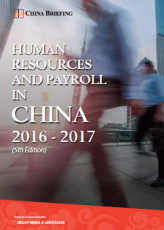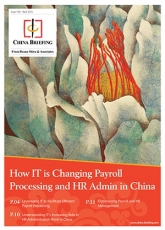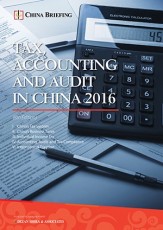China Regulatory Brief: New Safety Standards for Cosmetics & Shanghai Wage Payment Measures
New Chinese Safety Standards for Cosmetics to Enter into Force as of December 2016
By Cisema GmbH
Contact: info@cisema.de
As announced in June 2015, new safety standards for cosmetics in China will replace the previous standards issued in 2007. Major changes concern ingredients, quality control, and packaging. The changes regarding ingredients are required to be implemented by December 1, 2016, while it will be sufficient to follow the new requirements for quality control and packaging for any first prolongation application after that date.
The changes include:
- Prohibited ingredients: 1388 (added: 133, modified: 137)
- To a limited extent permitted ingredients: 47 (added: 1, modified: 31, removed: 27)
- Preservatives: 51 (modified: 14, removed: 5)
- Sunscreen products: 27 (modified: 6, removed: 1)
- Colouring agents: 157 (added: 1, modified: 69)
- Hair dyes: 75 (modified: 63, removed: 21)
New Measures for Wage Payment in Shanghai Implemented on August 1
The newly revised measures for wage payment in Shanghai, which were recently implemented on August 1, set the rates of salary for employees in probation. The new rules state that an employer must pay no less than 80 percent of the minimum wage paid to employees of the same position within the same company, or less than 80 percent of the wage as stated in the labor contract. In addition, the salary is not to be below the minimum wage standard as specified by local or municipal governments. Moreover, the hourly salary rates of non-full time employees are to be agreed between the employer and employees, but still not below minimum wage standards. The period of remuneration must not exceed 15 days.
![]() RELATED: Payroll and Human Resource Services
RELATED: Payroll and Human Resource Services
Enterprises Able to Select Favorable Domestic Sales Tax Rates
A notice regarding the expansion of the Pilot Program of the Policy for Selective Levying of Tariffs on Domestic Sales will come into effect as of September 1, 2016. Previously, bonded processing enterprises in special customs supervision areas were required to levy tariffs according to the applicable tax rates of the finished goods, as well as its domestic sales price of the commodities for exportation. The implementation of this new policy means that enterprises in the special bonded zones may select to pay tariffs of applicable tax rates and domestic sales price of finished products which benefit them the most. The notice was issued jointly by the Ministry of Finance (MOF), General Administration of Customs (GAC), and the State Administration of Taxation (SAT).
Beijing Raises Monthly Minimum Wage Standard to RMB1,890
On August 10, the Beijing Municipal Human Resource & Social Security Bureau announced an adjustment of the minimum wage standard in Beijing from RMB1,720 per month to RMB1,890, effective as of September 1, 2016. At the same time, the minimum hourly wage standard of part-time employees has increased from RMB18.7 per hour to RMB21 per, with statutory holiday pay increasing from RMB45 per hour to RMB49.9. The provinces of Chongqing, Liaoning, Jiangsu, Shanghai, Hainan, Shandong, Tianjin, and Hebei have also raised the minimum wage standard, with Shanghai boasting the highest minimum monthly wage of RMB2,190.
|
Asia Briefing Ltd. is a subsidiary of Dezan Shira & Associates. Dezan Shira is a specialist foreign direct investment practice, providing corporate establishment, business advisory, tax advisory and compliance, accounting, payroll, due diligence and financial review services to multinationals investing in China, Hong Kong, India, Vietnam, Singapore and the rest of ASEAN. For further information, please email china@dezshira.com or visit www.dezshira.com. Stay up to date with the latest business and investment trends in Asia by subscribing to our complimentary update service featuring news, commentary and regulatory insight. |

 Human Resources & Payroll in China 2016-2017 (5th Edition)
Human Resources & Payroll in China 2016-2017 (5th Edition)
A firm understanding of China’s laws and regulations related to human resources and payroll management is absolutely necessary for foreign businesses in China. This edition of HR and Payroll, updated for 2016/17, navigates China’s laws and regulations related to HR and payroll management – essential information for foreign investors looking to establish or already running a foreign-invested entity in China.
 How IT is Changing Payroll Processing and HR Admin in China
How IT is Changing Payroll Processing and HR Admin in China
In this edition of China Briefing magazine, we examine how foreign multinationals can take better advantage of IT in the gathering, storing, and analyzing of HR information in China. We look at how IT can help foreign companies navigate China’s nuanced payroll processing regulations, explain how software platforms are becoming essential for HR, and finally answer questions on the efficacy of outsourcing payroll and HR in China.
 Tax, Accounting, and Audit in China 2016
Tax, Accounting, and Audit in China 2016
This edition of Tax, Accounting, and Audit in China, updated for 2016, offers a comprehensive overview of the major taxes that foreign investors are likely to encounter when establishing or operating a business in China, as well as other tax-relevant obligations. This concise, detailed, yet pragmatic guide is ideal for CFOs, compliance officers and heads of accounting who must navigate the complex tax and accounting landscape in China in order to effectively manage and strategically plan their China-based operations.
- Previous Article Cutting Through the Red Tape: CFDA Plans to Accelerate the Review Process for Medical Devices
- Next Article Registered Capital, Company Loans, and the Timely Repatriation of Profits for WFOEs in China





























